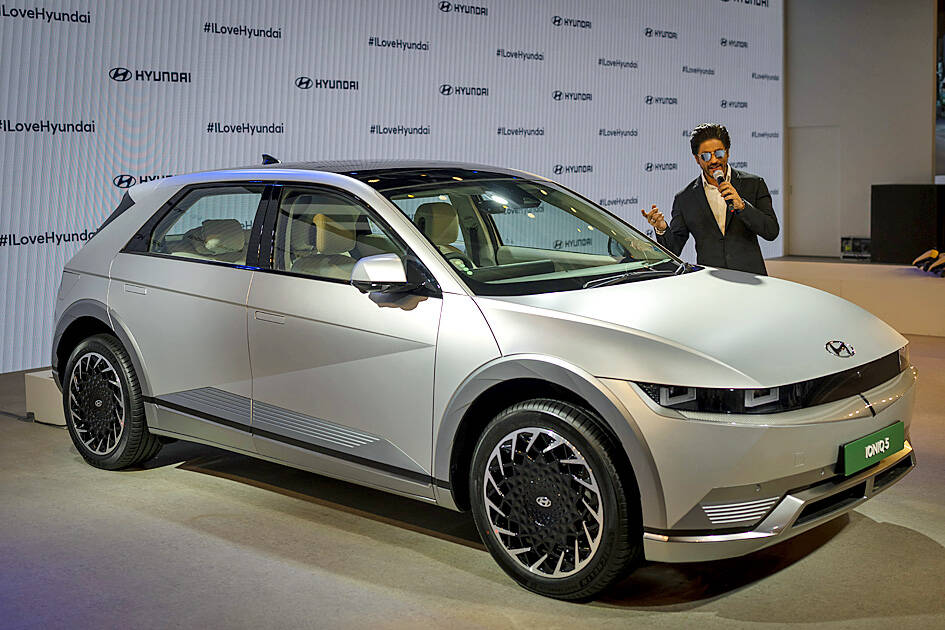Hyundai Motor Co said it would sell 2 million electric vehicles (EVs) annually by 2030, raising its forecast from 1.87 million a year earlier, as demand for clean-energy vehicles continues to surge.
The South Korean automaker also plans to spend about 109 trillion won (US$84.8 billion) to boost production and make progress in areas such as hydrogen vehicles, it said in a statement yesterday.
The investment pledge from the world’s third-biggest automaker follows Toyota Motor Corp laying out an ambitious plan to sell 1.5 million battery EVs by 2026. Ford Motor Co is pursuing a radical restructuring with ambitions to make 2 million EVs a year by 2026.

Photo: AP
Hitting the new goal would mean thatHyundai’s EVs, including luxury brand Genesis, would account for 18 percent of its global sales in 2026 and 34 percent in 2030, the company said.
They would make up 53 percent of its sales in three key markets — South Korea, the US and Europe — by the end of the decade. Volkswagen AG expects electric-battery vehicles to account for 20 percent of its global sales by 2025.
Hyundai and Kia Motors Corp have sold about 109,000 EVs this year, placing them fifth in the global industry, BloombergNEF said.
Hyundai is facing pressure in the US and Europe to increase domestic production of clean vehicles and reduce reliance on battery minerals and components made in China.
The company aims to start mass production at its EV plant being built in the US state of Georgia in the second half of next year, CEO Jay Chang said at an annual event for investors yesterday.
Meanwhile, Renault SA on Monday laid out financial goals for its EV arm Ampere — including to break even on an operating basis as soon as 2025 — as it readies the division for an initial public offering.
The French automaker, which described the unit as “a growth story,” is targeting a 30 percent compound annual growth rate until 2030, the firm said in a statement.
Renault CEO Luca de Meo would take on the additional roles of CEO and chairman of the EV arm.
Even as Renault gives an upbeat outlook for Ampere, the business faces several challenges as De Meo works to bring it to market. Price cuts in Europe from US rival Tesla Inc, for example, risk denting demand for a new model touted as key for the automaker’s turnaround, the fully electric Megane E-Tech.
To fend off the competition, Renault is reintroducing a lower-priced Megane E-Tech version featuring a smaller battery.

TECH SECURITY: The deal assures that ‘some of the most sought-after technology on the planet’ returns to the US, US Secretary of Commerce Gina Raimondo said The administration of US President Joe Biden finalized its CHIPS Act incentive awards for Taiwan Semiconductor Manufacturing Co (TSMC, 台積電), marking a major milestone for a program meant to bring semiconductor production back to US soil. TSMC would get US$6.6 billion in grants as part of the contract, the US Department of Commerce said in a statement yesterday. Though the amount was disclosed earlier this year as part of a preliminary agreement, the deal is now legally binding — making it the first major CHIPS Act award to reach this stage. The chipmaker, which is also taking up to US$5 billion

TRADE WAR: Tariffs should also apply to any goods that pass through the new Beijing-funded port in Chancay, Peru, an adviser to US president-elect Donald Trump said A veteran adviser to US president-elect Donald Trump is proposing that the 60 percent tariffs that Trump vowed to impose on Chinese goods also apply to goods from any country that pass through a new port that Beijing has built in Peru. The duties should apply to goods from China or countries in South America that pass through the new deep-water port Chancay, a town 60km north of Lima, said Mauricio Claver-Carone, an adviser to the Trump transition team who served as senior director for the western hemisphere on the White House National Security Council in his first administration. “Any product going

CHANGING JAPAN: Nvidia-powered AI services over cellular networks ‘will result in an artificial intelligence grid that runs across Japan,’ Nvidia’s Jensen Huang said Softbank Group Corp would be the first to build a supercomputer with chips using Nvidia Corp’s new Blackwell design, a demonstration of the Japanese company’s ambitions to catch up on artificial intelligence (AI). The group’s telecom unit, Softbank Corp, plans to build Japan’s most powerful AI supercomputer to support local services, it said. That computer would be based on Nvidia’s DGX B200 product, which combines computer processors with so-called AI accelerator chips. A follow-up effort will feature Grace Blackwell, a more advanced version, the company said. The announcement indicates that Softbank Group, which until early 2019 owned 4.9 percent of Nvidia, has secured a

CARBON REDUCTION: ‘As a global leader in semiconductor manufacturing, we recognize our mission in environmental protection,’ TSMC executive Y.P. Chyn said Taiwan Semiconductor Manufacturing Co (TSMC, 台積電), the world’s biggest contract chipmaker, yesterday launched its first zero-waste center in Taichung to repurpose major manufacturing waste, which translates into savings of NT$1.5 billion (US$46 million) in environmental costs a year. The environmental cost savings include a carbon reduction benefit of 40,000 tonnes, equivalent to the carbon offset of over 110 Daan Forest Parks, the chipmaker said. The Taichung Zero Waste Manufacturing Center is part of the chipmaker’s greater efforts to reach its net zero emissions goal in 2050, aligning with the UN’s 12th Sustainable Development Goal. The center could reduce TSMC’s outsourced waste processing